Spilling westwards from the crescent of Dublin Bay, Ireland’s ‘Fair City’ (as the famous song goes) is one of the few world capitals that is also very much a student city. This is a town that warmly embraces students from home and abroad.
As a result, every year, thousands of international students choose Dublin as a place to complete undergraduate or Master’s studies. And every year, they rave about what a liveable, friendly city it is.
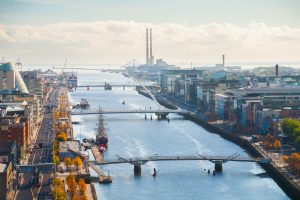
Dublin city – as seen from the air
Although small by world capital standards, Dublin is home to several world-class public educational institutions including Trinity College Dublin, University College Dublin and the Royal College of Surgeons in Ireland, as well as private colleges like Griffith College and Dublin Business School. This density of higher-level educational institutions, many of which are located at the heart of the city, means that Dublin has a thriving student cohort that lends great vitality to an already dynamic capital. The buzz is real!
Across the city, bars, pubs, cafes, sporting facilities, shops and restaurants have student deals and discounts, and at least until Covid, it has been relatively easy for young people and students to find part-time work at many of these places in order to support them while they study.
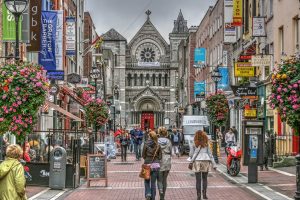
Dublin is full of narrow streets, many of them pedestrianised (Photo: Shutterstock)
Accommodation in Dublin
The biggest cost for students is accommodation, with options ranging from purpose-built campus and off-campus housing where you can pay up to €1,000 per month for a room and bathroom of your own, to €450 for a shared room in a house in the suburbs, or lodging with a host family. The international office at your university or college will have information, but this guide is a great start and covers everything from on-campus options to home stays.
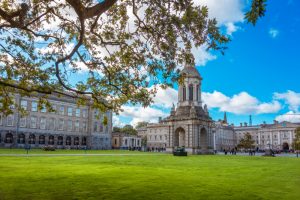
Trinity College is just one of the main colleges and universities offering on-campus student accommodation (Photo: Shutterstock)
Getting a Job
If you’re looking for work, it’s worth making sure you have an up-to-date CV* ready to share when you arrive (*in Ireland, you are not obliged to put a photo or your date of birth on your resume if you don’t want to). You will also need a valid student visa, a bank account and a Public Service Number (PPS) so you can be paid electronically, and also legally employed, with all the protection that offers. For more details, see our guide to Working In Ireland
If you are not an EU citizen or from Switzerland, you must register with the Garda National Immigration Bureau. The Garda are Ireland’s police and are generally very friendly and helpful. More info on registering can be found here
Public Transport
Dublin has an extensive bus network; a tram system with two lines, called the Luas (pronounced Loo-iss, it means ‘speed’ in the Irish language!); and the DART (Dublin Area Rapid Transit) trains, which run along the coast from Greystones in the south to Howth in the north. It’s also a very popular city for cyclists, with lots of cycle paths and the option of quickly renting bikes from many of the stations located around the city.

The DART commuter train runs along the coast
(Photo: TripSavvy)
In general, the closer you live to the Luas and Dart, the more rent you pay. Like any capital city, Dublin has traffic congestion problems, but with so many more people now working from home post-lockdown, peak-time congestion has improved and we hope it will continue to improve! For everything you need to know about public transport in Ireland, visit https://www.dublinpublictransport.ie/
Health and safety
Dublin is a very safe city, though the density of pubs, clubs and bars in the city centre can mean it’s noisy on weekends in particular, though Covid has mitigated this a lot. Currently, Ireland has been able to emerge from the lockdown earlier than originally planned, and community transmission of Covid remains very low, meaning that venues are open for business.
In terms of physical health, the situation regarding medical support from a doctor or hospital varies according to whether you are an EU or non-EU citizen. Either way, it’s essential that you get health insurance cover before you arrive. Once you access it, the quality of health care is excellent. Read more in our guide.
Religious Worship
Dublin’s broad cultural diversity means that it is now home to several mosques as well as a wide array of Christian, Catholic and Protestant/Anglican churches and places of worship. So if you’re part of a religious community, you will find an extension of that community here too.
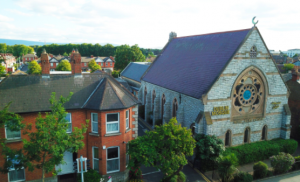
The Dublin Mosque is one of many in the city
(Photo: Islamic Foundation)
Stay Connected Online
As you might expect from the home of tech giants like Google and Facebook, it is easy to find free wi-fi in Dublin. Almost every cafe or pub has it, and all of the phone networks offer competitive deals on data, with the best value being SIM-only options. For more information, visit https://switcher.ie/mobiles/
Best Things to Do in Dublin
This is where the FUN begins! Dublin offers so much to do, from eating out, to beautiful parks and seaside villages, open-air food markets and, of course, cool pubs, clubs and bars.
In the last five years, there has been a big move towards veganism, vegetarianism and low- or no-alcohol drinking, which means that many cafes and bars now offer these options. It’s also a far more culturally diverse city than it was even 15 years ago, so whether you’re from Korea or Malaysia, Mexico or Brazil, there are dishes available which mean you will not have to miss home (at least not too much)
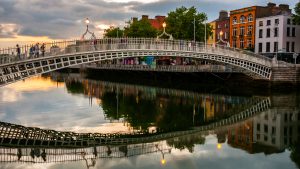
Dublin’s Ha’penny Bridge – a much loved landmark that spans the River Liffey (Photo: Shutterstock)
Of course one of the best things about coming to live in a new city is getting to know it up close and personally. Walking through it, seeing its streets and landmarks, rivers and canals (in Dublin there are plenty), is a great way of familiarising yourself with your new base, but there are also many useful online resources, including Instagram accounts like @dublinsocial and the brilliant @I_come_undone, who every weekend offers her personal guide to things to do in the city, many of which are free or very low cost. Check them out!
As a taster of Dubin, of what makes the city unique, we’ve put together this little list:
Parks
Oh there are many, but nothing beats the Phoenix Park for sheer size and beauty. Europe’s biggest urban park is home to the residences of the President of Ireland and the U.S. Ambassador to Ireland, Dublin Zoo and, of course, herds of roaming sika deer, which can be seen photobombing every picnic or game of football around.

The Phoenix Park – big and beautiful, with lots to do including visiting Dublin Zoo, cycling, walking, running.
The Seaside Experience
Dublin city hugs the coast, and whether it’s twinkling in the sunlight or tossing itself around in a storm, the sea in Dublin draws people in their thousands to its beaches, cycle paths and walks. Head north to Howth to enjoy the Cliff walk followed by fish ‘n chips, or go south to Dun Laoghaire, stroll the pier and get your hands on one of Dublin’s true icons: a ‘whippy cone’ from Teddy’s Ice Cream.
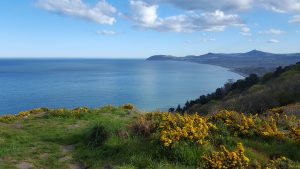
The view from Killiney Hill in south Dublin, towards Bray in Co. Wicklow (Photo: shutterstock)
A pint of plain
This is what the Irish call Guinness, the world-famous ‘black stuff, which is still brewed in Dublin. And because the water used in production is Irish, the Guinness here tastes better than anywhere else in the world. Really. Every pub serves it, but the quality varies. But you can sure have fun in the tasting! And of course, a visit to the Guinness Storehouse is always memorable, not least for the incredible view.

Guinness – loved by the Irish and non-Irish in equal measure! (Photo: Shutterstock)
Eating out
Dublin is packed with restaurants and cafes, though many took a major hit during the height of Covid. They’re still adjusting, but there’s already a buzz back in the city now that it’s emerging from lockdown. There are eateries of every style and ethnicity, and at every price point imaginable. The north inner city has become a sort of mini Chinatown, but there’s also Nigerian, Korean, Japanese, Malaysian, Brazilian, Mexican and many more cuisines to choose from.
Museums and Galleries
Most of the city’s cultural institutions open in just over a week on July 20th, and they have plenty to tempt you, not least because entry to most of them is free. Some exhibitions are ticketed, however, usually in the larger galleries. Highlights include the Museum of Literature Ireland on Stephen’s Green, the Little Museum of Dublin (also on Stephen’s Green) and the impressively renovated National Gallery on Clare Street.
The People
There is plenty more to see in Dublin than we have room for in this guide, but the city’s biggest attraction, and the thing that makes it special, is its people. Warm-hearted, gregarious and hospitable, the Irish love nothing more than a chat and a chance to have the ‘craic’ (loosely translates as ‘fun’ in the Irish language). And long after international students have moved on or gone home, it’s the Irish people they remember most of all.

